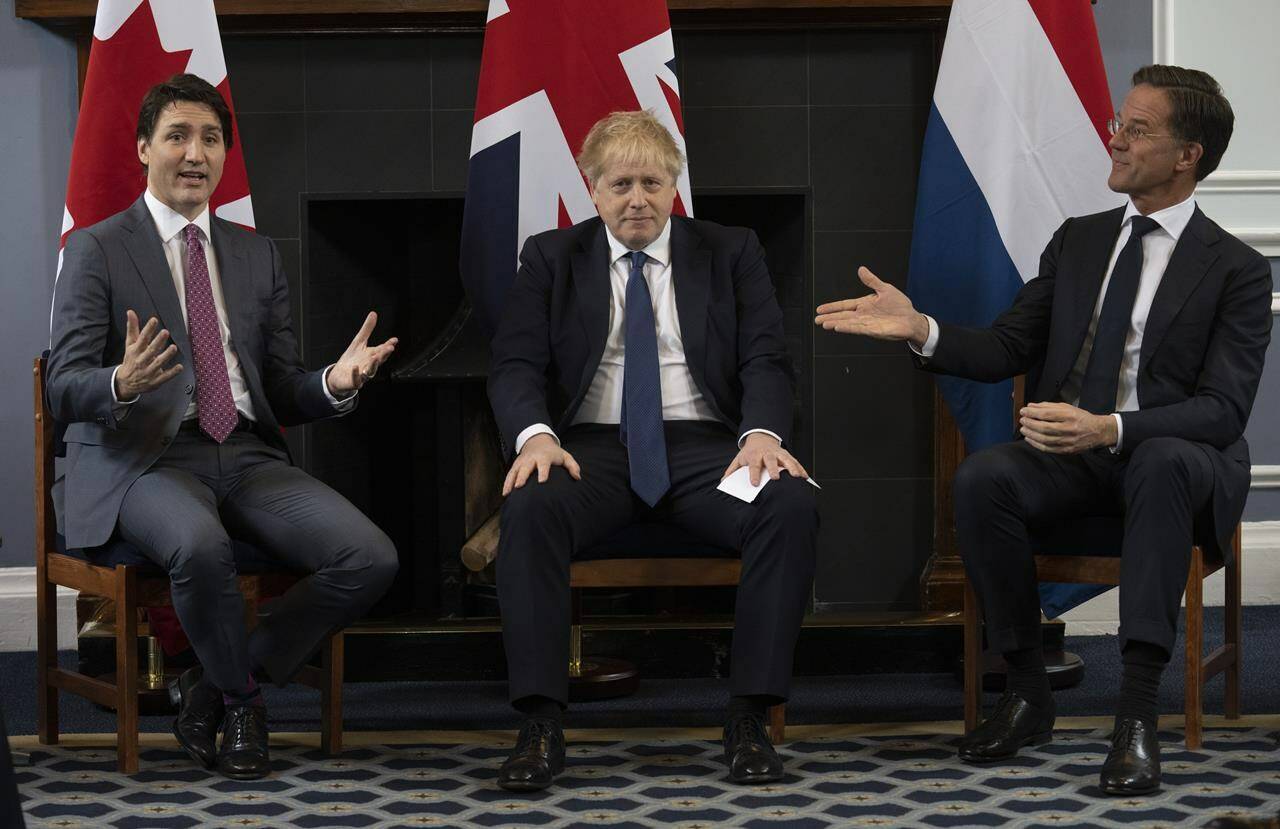Prime Minister Justin Trudeau and his British and Dutch counterparts displayed a show of solidarity with besieged Ukraine on Monday at a historic military base that helped defend Britain during the Second World War.
“We want to stand with the Ukrainian people and push back hard against Russia,” Trudeau said after arriving at the Royal Air Force Station Northolt outside of London where he was meeting with British Prime Minister Boris Johnson and their Dutch counterpart, Mark Rutte.
Trudeau met with each leader separately and together, where Russia’s invasion of Ukraine was the key conversation. They were to strategize on the response of NATO countries to the conflict.
They spoke inside an officers mess building outside a vast airfield that was also a base for the Polish Air Force and played a pivotal role in the Battle of Britain.
The Polish squadron registered the most shootdowns of Nazi aircraft on flights out of the base during the course of the epic battle. Rutte and Johnson both acknowledged the role the base played in the Second World War.
Canada, Britain and their NATO allies have rejected desperate Ukrainian pleas for a no-fly zone to protect their civilians from Russian bombardment because they fear it could start a new world war if they engage with Russian planes.
An adviser to the Ukrainian president said Monday a fourth round of talks with Russia would begin later in the day as the Russian bombardment entered its 12th day, inflicting upwards of 360 civilian casualties.
Johnson welcomed his “friend” Trudeau to the airbase, saying “Canada and the U.K. are at one on many things,” adding they were “particularly united in our stand against Putin’s aggression in Ukraine.”
Trudeau said he was happy to “hold Russia to account and stand up for democracy around the world.”
Trudeau added that he “wants to talk about countering misinformation and upholding the principles and values that they share.”
Trudeau also had an audience with the Queen at Windsor Castle Monday. This was the Queen’s first in-person audience with a leader since she tested positive for COVID-19 on Feb. 20.
Trudeau, Johnson and Rutte are also sitting down together at 10 Downing Street in London. As he arrived at Johnson’s official residence and executive office, Trudeau was greeted by protesters cursing at him and waving Canadian flags and placards calling for the release of Tamara Lich, one of the organizers of last month’s trucker protests in Ottawa.
In the following days, Trudeau will also be meeting with other leaders in Riga, Latvia, Berlin and Warsaw, Poland.
The prime minister’s agenda in Europe also includes a meeting with NATO Secretary-General Jens Stoltenberg and a visit to the Latvian military base where hundreds of Canadian Forces personnel are contributing to Canada’s leadership in that country of NATO’s long-standing deterrence mission to bolster its eastern European flank against Russia.
Canadian Foreign Affairs Minister Mélanie Joly has been in Europe over the past few days in meetings with NATO and European Commission officials about ongoing efforts to sanction Russia.
International Development Minister Harjit Sajjan will also travel to Geneva and then join Trudeau in eastern Europe to meet with the United Nations and others for talks on Ukraine.
The British defence ministry said Sunday in an intelligence update that Russia’s tactics in Ukraine were comparable to their previous pummeling of cities in Chechnya in 1999 and Syria in 2016 with airstrikes and artillery, after Russian forces faced unexpected resistance. The intelligence report said the strength of Ukrainian fighters continues to surprise the Russians, and that the bombing of cities, including Kharkiv, Chernihiv and Mariupol represented an effort to break Ukrainian morale.
In a one-hour conversation on Sunday, Turkish President Recep Tayyip Erdogan urged Russian President Vladimir Putin to cease the fighting in an attempt to address humanitarian concerns and try to find a political solution.
The Kremlin said Putin replied that Russia’s military action in Ukraine could be halted “only if Kyiv ceases hostilities and fulfils the well-known demands of Russia.”
With a third round of negotiations between Ukraine and Russia set for today, the Kremlin said Putin expressed his hope that Ukraine would fully consider “emerging realities.”
It is not possible to know the exact number of people killed so far since the Feb. 24 invasion. The United Nations human rights office said 364 civilians have been confirmed killed, but the true number is likely much higher.
Russian and Ukrainian officials have not provided information on military causalities.
—Mike Blanchfield, The Canadian Press
RELATED: Russia sets limited cease-fire for evacuations but battles continue
RELATED: B.C. politicians push stronger efforts for Ukraine as hundreds rally in downtown Victoria

